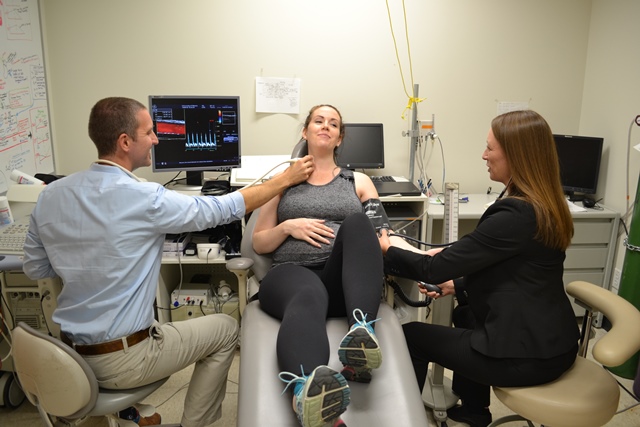
Margie Davenport (right), Craig Steinback (left) and team of postdoctoral, graduate and undergraduate students are working on a preeclampsia study looking at the mechanisms that regulate blood pressure in women with healthy and complicated pregnancies.
Researchers are at a loss to explain what causes high blood pressure in pregnancy, according to an exhaustive review by a team of University of Alberta researchers into hypertensive pregnancies.
"High blood pressure in pregnant women can lead to a number of illnesses such as gestational hypertension, kidney dysfunction and, most notably, preeclampsia," says Margie Davenport, who, along with fellow physiology associate professor Craig Steinback and postdoctoral fellow Laura Reyes, conducted the review. "Preeclampsia is very serious because it also puts the baby at risk. It can also progress to eclampsia, which can cause dramatic high blood pressure, seizures and even a coma in patients."
The crux of problem stems from the monumental changes undertaken by a women's cardiovascular system during pregnancy. Steinbeck explains that even in healthy pregnancies, the amount of blood mother and child's hearts are pumping increases dramatically.
"But a healthy pregnant woman's heart becomes larger and stronger and their blood vessels relax so that instead of their blood pressure going up, it actually goes down a bit," he said. "In hypertensive pregnancies, this relaxation of the blood vessels doesn't occur, leading to a number of cardiovascular health problems. Why this happens, however, is not understood."
According to Steinback, part of the reason why blood pressure related illnesses during pregnancy is little understood is because pregnant women are an understudied population. Viewed as a vulnerable population, pregnancy-related research is treated with he says is perhaps undue caution.
"Caution is certainly warranted when working with pregnant patients, but in order to understand the physiology and clinical treatment methods for this specific population we need to increase the amount of research specific to their needs. We shouldn't expect to use the same treatments for pregnant women as those based on the physiological understanding, derived from research done largely on male populations. Pregnancy research can be done safely, especially in labs like ours where we specialize in this area."
Currently, the team is working on a preeclampsia study looking at the mechanisms that regulate blood pressure in women with healthy and complicated pregnancies. Future research includes looking at ways to identify women who are at risk of high blood pressure during pregnancy. As well, Davenport is studying how physical activity patterns affect pregnant patients and their babies.
"We're trying to get to a point where we can say that we understand these mechanisms in both normotensive and hypertensive pregnancies," says Davenport. "From there we will be able to begin to develop potential predictive measures and treatment options we can trial, hopefully paving the way to improved health outcome for mother and baby."
Davenport is a Heart and Stroke Foundation National New Investigator in Women's Cardiovascular Health and Steinback is a Heart and Stroke Provincial and National New Investigator. Both are associate professors in the Faculty of Kinesiology, Sport, and Recreation. The paper was published in Hypertension and selected as the Editor's Pick for May 2018.